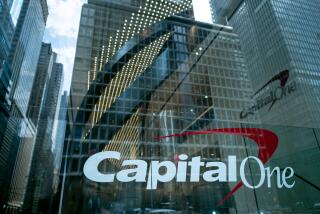Capital One to refund $150 million to credit card customers
WASHINGTON — What’s in your wallet? For about 2.5 million Capital One credit card customers, the answer will be refunds ordered by federal regulators who accused the bank of deceptive marketing tactics.
In the first major enforcement action involving the Consumer Financial Protection Bureau, Capital One agreed to refund $150 million to customers and pay $60 million in civil penalties to the government.
The McLean, Va., bank was accused primarily of duping customers into signing up for payment protection plans and other add-on services. The Office of the Comptroller of the Currency also accused the bank of improper billing in a limited number of cases.
“We are putting companies on notice that these deceptive practices are against the law and will not be tolerated,” Richard Cordray, director of the consumer bureau, said Wednesday in announcing the refunds and fines along with the comptroller’s office.
Capital One, known for TV ads in which Visigoths ask, “What’s in your wallet?” did not admit or deny liability in settling, saying instead that third-party vendors failed to adhere to company policy.
Consumer advocates praised the enforcement action as a sign that the new agency is beginning to crack down on bad bank behavior.
The case “sends a clear message: It’s a new day,” said John Taylor, president of the National Community Reinvestment Coalition, which has raised concerns about Capital One’s practices with regulators.
Along with the enforcement action, the bureau issued an advisory to consumers about deceptive sales pitches when they activate credit cards. Cordray said he expected enforcement actions against other banks for the same problems.
“This is not unique to a single institution,” he said.
For instance, Discover Financial Services said in a regulatory filing in June that the consumer bureau and the Federal Deposit Insurance Corp., also a key banking regulator, informed the company that they planned to take action over marketing practices for payment protection services and other products.
In Capital One’s case, bureau examiners found that the bank’s call-center vendors “engaged in deceptive tactics” to persuade customers with low credit scores or credit limits to sign up for extra services when they activated their cards.
Those services were payment protection plans in case the customer was unemployed or temporarily disabled, and credit monitoring for identity theft and other problems.
But Cordray said the customers “were pressured or misled into buying credit card products they didn’t understand, didn’t want or, in some cases, couldn’t even use.”
The bureau said that some customers were erroneously told that the products would improve their credit scores and help them increase the credit limit on their Capital One credit card.
Vendors working for Capital One also sometimes led customers to believe the products were free or were not optional, and misled them about how the products worked, the bureau said.
In addition, customers sometimes were wrongly told they had to buy the product before they could be given full information about it but could always cancel the service, the bureau said. Many customers later had difficulty canceling.
Capital One said third-party vendors it hired “did not always adhere to company sales scripts and sales policies for payment protection and credit-monitoring products, and the bank did not adequately monitor their activities.”
“We are accountable for the actions that vendors take on our behalf,” said Ryan Schneider, president of Capital One’s credit card business.
“These marketing calls were inconsistent with the explicit instructions we provided to agents for how these products should be sold,” Schneider said. “We apologize to those customers who were impacted and we are committed to making it right.”
Capital One said that when it first learned of the problems late last year, it immediately stopped phone sales of the add-on services and began trying to identify customers to provide full refunds.
In the agreement with regulators, Capital One promised to refund the full amount paid for the services, plus interest, to about 2 million customers who initially enrolled for the services, or unsuccessfully tried to cancel them, on or after Aug. 1, 2010. Capital One also agreed to refund finance charges and other fees associated with the services.
The order from the consumer bureau required Capital One to pay $140 million in refunds for the deceptive marketing practices. The comptroller’s office, which also regulates Capital One, required the bank to pay an additional $10 million to about 500,000 customers for unfair billing practices for credit monitoring services from May 2002 to June 2011.
Consumers don’t need to apply for the refunds, regulators said. Capital One customers will get a credit on their accounts. People who are no longer customers will receive checks. Capital One said refunds would go out this year.
Of the civil fines, Capital One paid $25 million under the bureau’s terms and $35 million under the comptroller’s.







